An Alternative to Traditional Pet Insurance?
Dr. Allen Kamrava, Eusoh
 Dr. Allen Kamrava believes he has invented a better way to cover the costs of a catastrophic health event. According to Kamrava, advances in technology allow for a community-based model that can replace typical pet health insurance. Dr. Allen Kamrava is a physician and surgeon. He is also the founder of Eusoh, which is a community based, cost sharing service that's the modern alternative to traditional pet insurance.
Dr. Allen Kamrava believes he has invented a better way to cover the costs of a catastrophic health event. According to Kamrava, advances in technology allow for a community-based model that can replace typical pet health insurance. Dr. Allen Kamrava is a physician and surgeon. He is also the founder of Eusoh, which is a community based, cost sharing service that's the modern alternative to traditional pet insurance.
Eusoh just went live. This was possible, according to Dr. Kamrava, because technology has really changed the world. He says there is the "sharing economy," but a lot of what we're doing in the world now is actually the "just in time economy." This is where things happen on the spot and rather than having a buildup and form these large pools of money, which is the traditional model, we have some centralized kind of company in the center to manage this large pool of money and pay things when they happen. So he has built a platform that's really kind of a "just in time" financing model for when the unexpected happens.
If we think about what insurance is at it's base, it's just crowdfunding, according to Dr. Kamrava. He explains that we all kind of forget because it's this huge company that we just accept as status quo. But really, they collect from all of us in the form of premiums and then hold it captive in some fund. They are then supposed to pay that back out when things happen.
The problem with that model always was, and we were really limited to it because of lack of technology, is that they make their money off that premium pool. So these companies have every incentive to make sure our premiums are as high as possible and to pay out as little as they can at the end of the year, because their profits are based on that fund.
However, there was really no better way to do it because of technical limitations, until now. Dr. Kamrava says we've reached a point now where that's an antiquated model. We can now connect people through their mobiles and their Web and build virtual communities that essentially promise that they're going to help each other. And so when things happen, you actually have a community that is ready and willing and that guarantees that they're going to chip in through micropayments to help things basically be covered or paid for when it happens. This brings down the cost tremendously by getting rid of that essentially kind of thick bureaucratic layer in the middle.
But what if everyone's pet gets sick at the same time, what would happen then? Dr. Kamrava explains that fortunately that doesn't happen that frequently. But even if it does, the scale of the system is enough to even cover that.
Dr. Kamrava tells us that he has had the model validated by multiple reinsurance companies. So while they are not insurance companies, which is what we are used to, they are actually insurance companies for the insurances in the world. They are called reinsurance. They get involved when there's those catastrophic clashes. That's when all of a sudden everything happens at once, which isn't expected. This allows Eusoh to guarantee to their members that they would basically make a deposit, which rolls over each month, but it's not used. But if something happens, it would draw from those micropayments and the members replenish that with a new deposit each month. He says you will never pay over that deposit in any given month. That's the max that you would ever pay for other people.
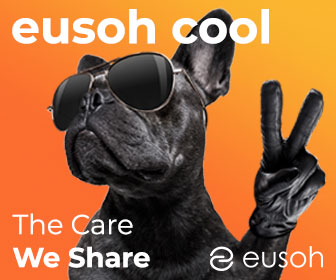 What about people who have multiple pets? Does everyone contribute the same whether they have one pet or six? What if someone is a hypochondriac and takes their dog to a veterinarian all the time?
What about people who have multiple pets? Does everyone contribute the same whether they have one pet or six? What if someone is a hypochondriac and takes their dog to a veterinarian all the time?
Eusoh has just got the ball rolling for each dog, which for instance, would be just their own kind of unit member. So there would be a deposit for each dog and each one would kind of count as its own little contribution. As they grow, they will figure out how to better attain for people have multiple pets.
As far as someone taking their pet to the vet's for every little thing, this is the most complex. Dr. Kamrava explains that actually a very small percentage of people take advantage of the system and treat their coverage as kind of a blank check and want to do everything. Some people feel its just going to keep paying for everything once they get past their deductible. So there are a lot of safeguards built in to Eusoh to help protect and identify that.
One of them is the community aspect. It's one thing if it's someone versus the big corporation that they have no connection with, but it's another thing if people are in a group together and everyone can see who is racking up the bills and who is paying the bills. So there's a very big community component to this to really help incentivize people to be a little bit more responsible.
So this means if you belong to a group, you are aware of what everybody else spends and when they visit a vet. Everyone will be aware of what you do as well. There are people who aren't going to like people knowing what happened to their animal, but Dr. Kamrava thinks most people are okay with that. They feel that if their dog became ill everyone is helping them pay if they need an expensive surgery. He tells us that personally he would enjoy much more knowing each month where his money went and would like it if it went to his friend's dog rather than having it just go to a premium that he has no idea what it's touching.
Dr. Kamrava explains that they don't breed discriminate and they are taking the agnostic approach. He says its really up to the groups. The groups form, co-regulate themselves and then they choose who and what they want to share and bring in. There are potentially people who try to join a group but find out it's not for them. But the system as a whole is really agnostic.
There will also be cohorts of people who have older dogs. You would then expect that overall their month-to-month spending will be a little bit higher than the ones that have younger dogs. So you would assume that there's going to be affinity groups that join that have some similarities and those will change in terms of what they're covering with one another.
About 65-percent of Americans have a pet, but less than 2-percent have pet insurance. Most people have essentially said they will pay for any vet bills themselves. The issue is that one day when a large bill comes, a lot of people actually haven't saved up as much as they thought they would, so it becomes a life and death decision for the larger bills. For the day-to-day stuff, it doesn't necessarily make sense. It's really when you're making a decision between whether or not you are going to pay your mortgage this month or keep your family member alive. It's really for those situations, that unforeseen large one that people may not have the resources to cover.
The goal of Eusoh is really for the big things. But as they started this, to get it going, they actually made it all encompassing to include vaccinations. Dr. Kamrava expects that as they grow and become larger, there's going to be micro-communities with some saying they don't want to do vaccines and others that do want to do them. There's also going to be ones that only want to cover up to a certain amount. Eusoh is going to allow that to parse out and grow once they get over a certain kind of a threshold. They're just not there as of yet, but they expect that fully to happen as well.
So what happens if Eusoh goes belly up in a year and you've invested a lot of money? At least fi you use a pet insurance company they are most likely insured.
Eusoh actually has a reinsurer and they are working with the reinsurers to build out that as well. They warrant that you'll never pay over a certain amount. On the insurance side, you're actually paying money into a fund that's supposed to be protected so it doesn't get used and so there's an actual large fund of money that is yours and it's being held stored in essentially like an escrow account. The difference with Eusoh is that they are not paying continuously this constant amount that's being held in an escrow account. They are literally just funding stuff as it happens. So if someone has something that happened that month, it gets drawn on that. Otherwise there's no fund of money that's being held and maintained.
Eusoh is not meant as a way to police other people. Dr. Kamrava says it is more meant as for people to help support one another. As costs are being submitted, the database is being updated. It is accessible and allows people see what they should be paying for things.
Visit Website
10th Annual Cross-country Pet Adoption Tour: Get Your Licks on Route 66
Susan Sims, Fido Friendly Magazine
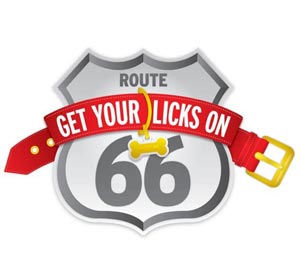 The Tenth Annual Get Your Licks on Route 66 Adoption Tour recently kicked off in Los Angeles. The Get Your Licks on Route 66 Adoption Tour is an annual cross-country pet adoption tour. They start in Los Angeles and go all the way to Chicago and work their way back. The tour is to help raise money for the shelters along the way and to raise awareness for the plight of these shelter animals. Their first 9 Get Your Licks on Route 66 Tours helped place over 10,000 pets into new forever homes.
The Tenth Annual Get Your Licks on Route 66 Adoption Tour recently kicked off in Los Angeles. The Get Your Licks on Route 66 Adoption Tour is an annual cross-country pet adoption tour. They start in Los Angeles and go all the way to Chicago and work their way back. The tour is to help raise money for the shelters along the way and to raise awareness for the plight of these shelter animals. Their first 9 Get Your Licks on Route 66 Tours helped place over 10,000 pets into new forever homes.
Today the tour takes them to Midwest City, Oklahoma. Susan brings her giant spinning filled with prizes donated by their sponsors. Sponsors include Nissan, Tito's Vodka, DogLeggs, PawPack, Petcurean, Buddy Belts, Hands On Gloves, Rolf C. Hagen, Embrace Pet Insurance Cosequin Joint Health Supplements, Petmate, Dexa, Canidae, Handicapped Pets, Shed Defender, Outward Hound, Charlee Bear, The Company of Animals, The Honest Kitchen, John Paul Pet, Blue Dog Bakery, Old Mother Hubbard, Affordable Allergy Testing, Royal Animals, PureLuxe Pet Food, Brilliant Pad, Bike Tow Leash, The Emergency Tag Help 4 Pets and Kurgo.
Here are the upcoming dates for the tour:
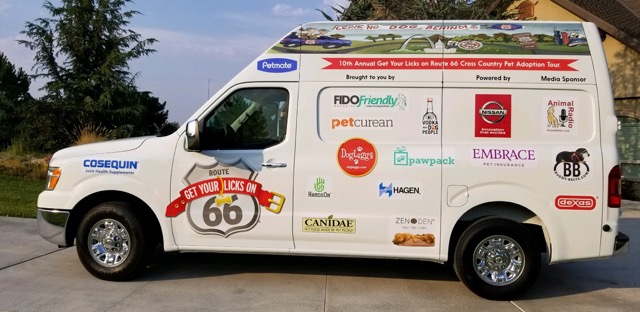 September 30
September 30
St. Louis, Missouri 10:00am-3:00pm
Tiles Park, K-9 Carnival, 9551 Litzinger Rd., St. Louis, MO
October 6
Chicago, Illinois 11:00am-3:00pm
Paws Chicago, 1997 N. Clybourn Ave., Chicago, IL
October 7
Springfield, Illinois Noon-4:00pm
Scheels Sporting Goods, 3801 S. MacArthur Blvd., Springfield, IL
 October 13
October 13
Kansas City, Missouri 2:00pm-6:00pm
Wayside Waifs, 3901 Martha Truman Rd., Kansas City, MO
Even if you are not planning on adopting a new family member, come on out and have some fun and see the animals. You can also win prizes on the spinning wheel, with donations going to your local shelter. It's a great way to support your local shelter and have fun at the same time.
Visit Website
Are Wildlife Preying on Your Pets? - Dr. Debbie
 As a veterinarian I used to think a dog fight was one of the worst things that could happen to a pet while out walking. But wildlife attacks on pets are a real and present danger. Remember the scene from the Sandra Bullock movie, The Proposal, in which Kevin, the American Eskimo puppy, is carried off by an eagle? Recently Boss, my 16-pound mixed breed dog, became a target of a flying predator not in remote Alaska, but smack dab in the heart of Las Vegas' suburbia.
As a veterinarian I used to think a dog fight was one of the worst things that could happen to a pet while out walking. But wildlife attacks on pets are a real and present danger. Remember the scene from the Sandra Bullock movie, The Proposal, in which Kevin, the American Eskimo puppy, is carried off by an eagle? Recently Boss, my 16-pound mixed breed dog, became a target of a flying predator not in remote Alaska, but smack dab in the heart of Las Vegas' suburbia.
During a walk at our community park before sunrise, I heard a loud beating of wings as a Great Horned Owl swooped down over Boss, my 16-pound terrier mix. My other dog Nikki, a Bouvier des Flanders, ran up to Boss and the owl flew off and retreated to a light pole and sat studying Boss' movements. Fearing the owl appeared ready for a second try, I snatched Boss in my arms and hightailed it out of there.
Boss was lucky to have the deterrent of an eighty pound doggie sister nearby. But not all pets get off so lucky when wildlife predators are concerned. Outdoor cats and dogs may disappear during the night falling victim to a suspected coyote attack. Small pets under 20-pounds can be whisked off by birds of prey. Stories of wildlife attacks such as these occur all the time and the internet reads of horrific stories by owners who lose their small pets to wildlife.
What Animals To Watch For?
Coyotes are found not only in rural areas, but also thrive in metropolitan areas. Mountain lion and bobcats are other predators that are a concern for homeowners in more remote areas or along the outskirts of towns. Birds of prey such as owls, hawks, and eagles are very capable hunters, are protective of nesting sites and can easily carry off small animals two to three times their body weight.
 What Can You Do?
What Can You Do?
Be especially watchful near parks, golf courses or near natural paths that wildlife use as travel corridors, such as flood channels or washes. Remember that an abundance of prey animals like wild bunnies in your community means prime hunting grounds for urban predators.
Don't leave your pets out at night unattended and preferably escort them using a leash. Wildlife rarely will approach a small pet if it is near a human or other larger animals.
Install motion activated lights on property.
Ensure all dog runs have a roof or fencing above to prevent predators from jumping over enclosure walls.
Building high fences and walls may seem like a solution, but predators can easily jump over these. Consider coyote fencing - a style of fencing that may help deter a predator from entering your backyard. Visit Coyote Roller - an ingenious and humane method to prevent a coyotes and other dogs from being able to get over the top of fence with rolling metal bars installed along fence line.
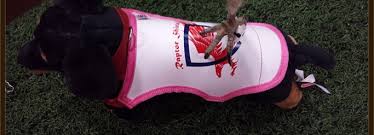 Avoid Attracting Prey Animals
Avoid Attracting Prey Animals
Take steps to make your yard less attractive to nuisance animals like possums and raccoons as well as potential prey animals. Remove wildlife feeding stations like bird feeders. Secure garbage cans. Keep brush trimmed and landscape maintained to avoid hiding sites for animals. Avoid fruit producing trees that serve as food sources. Feed pets indoors to avoid leaving a food source outside for mice, rats or other critters.
Any Other Tools to Protect Pets?
Check out the Raptor Shield, a lightweight protective cape made of polycarbonate plastic - the same compound used in bulletproof shields. This dog vest product was developed to stop a bird of prey's sharp talons from penetrating into small pets.
What To Do If Your Pet Is Targeted By Wildlife?
Make noise, wave arms and throw rocks to drive away animals. Carry a whistle, air horn or pepper spray for defense. Remember that some species of raptors are protected species and harassing or injuring them can result in fines.
Preventative efforts are far more useful than any steps you can take to spook away a predator after an attack occurs. Speak to your neighbors and share information if you spot coyotes or birds of prey in your neighborhood.
Don't get me wrong - I wish no ill will on nature's most efficient predators. I still find those soaring raptors breathtaking and I am awed by the coyote's adaptability, but from now on I'll prefer to watch nature's animal wonders with my little terrier guy safely seated on my lap.
Featured veterinarian known as "Dr. Debbie" on national pet radio program, Animal Radio. Ebook author of "Yorkshire Terriers: How to Be Your Dog's Best Friend"; "Pugs: How to Be Your Dog's Best Friend"; "Mini Schnauzers: How to Be Your Dog's Best Friend"; and "Shih Tzu: How to Be Your Dog's Best Friend." Dr. Debbie's books.
Visit Website
The Dogfather's Grooming Tip with Joey Villani
 Win The Fight Against Burrs & Foxtails
Win The Fight Against Burrs & Foxtails
Now that fall is upon us, when we take our pets out, the leaves are falling everywhere and depending upon where you live, burrs and foxtails are out everywhere. Unfortunately if you have a dog that has a long coat, it can pick up burrs and foxtails, which are very damaging. Foxtails are especially dangerous, because they can keep burrowing their way into a pet's skin. So grooming at this time of year is extremely important.
A lot of people ask Joey what they can do to prevent foxtails. He says there are a couple really easy things to do. Besides doing the normal brushing, after you've done that you should follow up with a combing. This will get the ones off that are still loose on the coat.
Surprisingly, a clean dog actually gets less burrs and foxtails. This is mainly because they don't have anything to stick to except the coat itself. When the coat is combined with dirt and oil, it allows these things to hold to the coat a little bit longer. Naturally, people think its crazy to wash their pet before going out on a hike in the woods.
You don't have to do a full shampoo wash before going on a hike. You can use dry shampoo. You can even use something easy like cornstarch. Just comb the cornstarch through your pet's coat, which will get rid of the dirt and oils, because it acts as a cleaning agent. Just be sure to do it outside, because it'll make a mess, but it works really well.
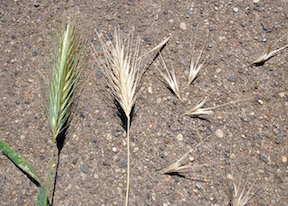 Another alternative is a silicone based coat spray. It might not be listed as silicone based, so just spray a small amount on your hand. When it dries, it should be slick. It should almost leave like a residue. You don't want to use this too often, but once a week is fine. Just spray and comb it through your pet's coat. What it will do is to make the coat slick allowing the burrs and foxtails to come out a lot easier when you comb your dog or maybe they won't stick it all. These products are safe, as they are pharmaceutical grade for pets.
Another alternative is a silicone based coat spray. It might not be listed as silicone based, so just spray a small amount on your hand. When it dries, it should be slick. It should almost leave like a residue. You don't want to use this too often, but once a week is fine. Just spray and comb it through your pet's coat. What it will do is to make the coat slick allowing the burrs and foxtails to come out a lot easier when you comb your dog or maybe they won't stick it all. These products are safe, as they are pharmaceutical grade for pets.
Lastly, and this is Joey's favorite product in the world and a big secret, is ShowSheen. Joeys says it make the coat slick and is basically Armor All for pets. Joeys says it is the greatest product known to mankind for coats.
Just remember it's important that you groom your pet after you take a good hike out outdoors.
Animal Radio News - Lori Brooks
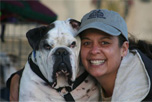 Dog and Cat Meat Trade Prohibition Act
Dog and Cat Meat Trade Prohibition Act
For years, animal lovers and animal welfare organizations have been working to end dog and cat meat sales that keep the dog meat farms in South Korea and China's Yulin Dog Meat Festival operational. There has now been a big step toward that goal, as the U.S. House of Representatives passed bipartisan legislation named the Dog and Cat Meat Trade Prohibition Act. The Act makes it "illegal to knowingly slaughter, ship, transport, move, deliver, receive, possess, purchase, sell or donate a dog or cat or his or her parts for human consumption, and authorizes a fine of up to $5,000 for each violation" in the United States.
Dogs vs. Cats
Do dogs or cats make you happy? The dog vs. cat argument will probably go on forever. But now there's a new survey that says dog owners are officially happier than cat owners, but not by much. Dog owners are only happier by a mere 4-percent. Pets were just a small component of the survey, as it was actually conducted by Life is Good and was more about optimism and positivity.
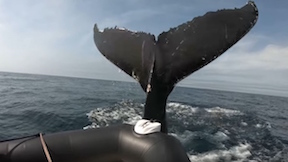 Whale Hits Boat
Whale Hits Boat
A passenger on a small boat recently took a captivating and scary viral video during a whale-watching trip. While the boat was still, a gigantic humpback whale's tail broke the water's surface directly in front of the boat, as if the whale was doing an underwater handstand. The tail actually came down and hit the boat. A humpback whale is more than 50 feet long and they generally weigh around 40 tons. Their tails grow to about 18 feet wide.
Many More Animals Being Used For Therapeutic Purposes
Dogs, miniature horses, cats, rabbits and even llamas are increasingly now being used to help heal and cheer the sick in hospitals, cancer clinics and other settings. However, research to support the efficacy of animal-assisted therapy is largely in its early stages and there is much more scientific work that needs to be done to know all of the benefits of animal therapy. The National Institute of Health started funding research on human-animal interaction in 2008, but far more research is done on dogs than on cats and other animals. However, there are signs of change. In March, a team led by scientists at the School of Veterinary Medicine at the University of California-Davis published a study in the journal Frontiers in Veterinary Science about interactions between family house cats and children with autism. While the study had a number of caveats, it pointed out, for example, that people who had "positive relationships with their cats" were probably more likely to participate. It found that cats in families with a child with autism-spectrum disorder "often provided valuable bonding, attention and calming affect to the child." It has been well proven that human relationships and social interactions are extremely good for someone's health, boosting the immune system and cardiovascular functions.
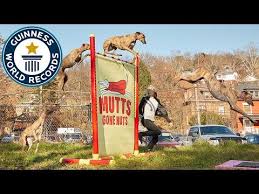 Turning "Throwaway" Animals Into Something Great
Turning "Throwaway" Animals Into Something Great
A Maryland woman's rescue dogs have both made their way into the Guinness Book of World Records for jumping. Guinness honored the woman's Greyhound, Feather, after a 75.5-inch high jump was recognized as the highest jump by a dog. Her other dog, a Border Collie named Geronimo, earned records for most skips by a dog in one minute, 91, as well as most Double Dutch skips by a dog in one minute, 128 of them. Both rescue dogs obviously found a dream owner, who says, "I feel like people have a lot of misconceptions about rescue dogs. Like 'oh someone threw it away, there must be something wrong with it, but I really enjoy taking people's throwaway animals and making them into something great."
The Golden State Leads The Way In Regulation Animal Welfare
California Legislature has passed a bill that allows stray kittens and puppies under eight weeks old to be immediately released from shelters to rescue groups who give them the specialized care they need. The bill will go into effect on January 1, 2019. Current state law requires kittens and puppies be held in public shelters for three days for owner redemption, but very few, if any, of these animals have owners.
 Listen to the entire Podcast of this show (#982)
Listen to the entire Podcast of this show (#982)





